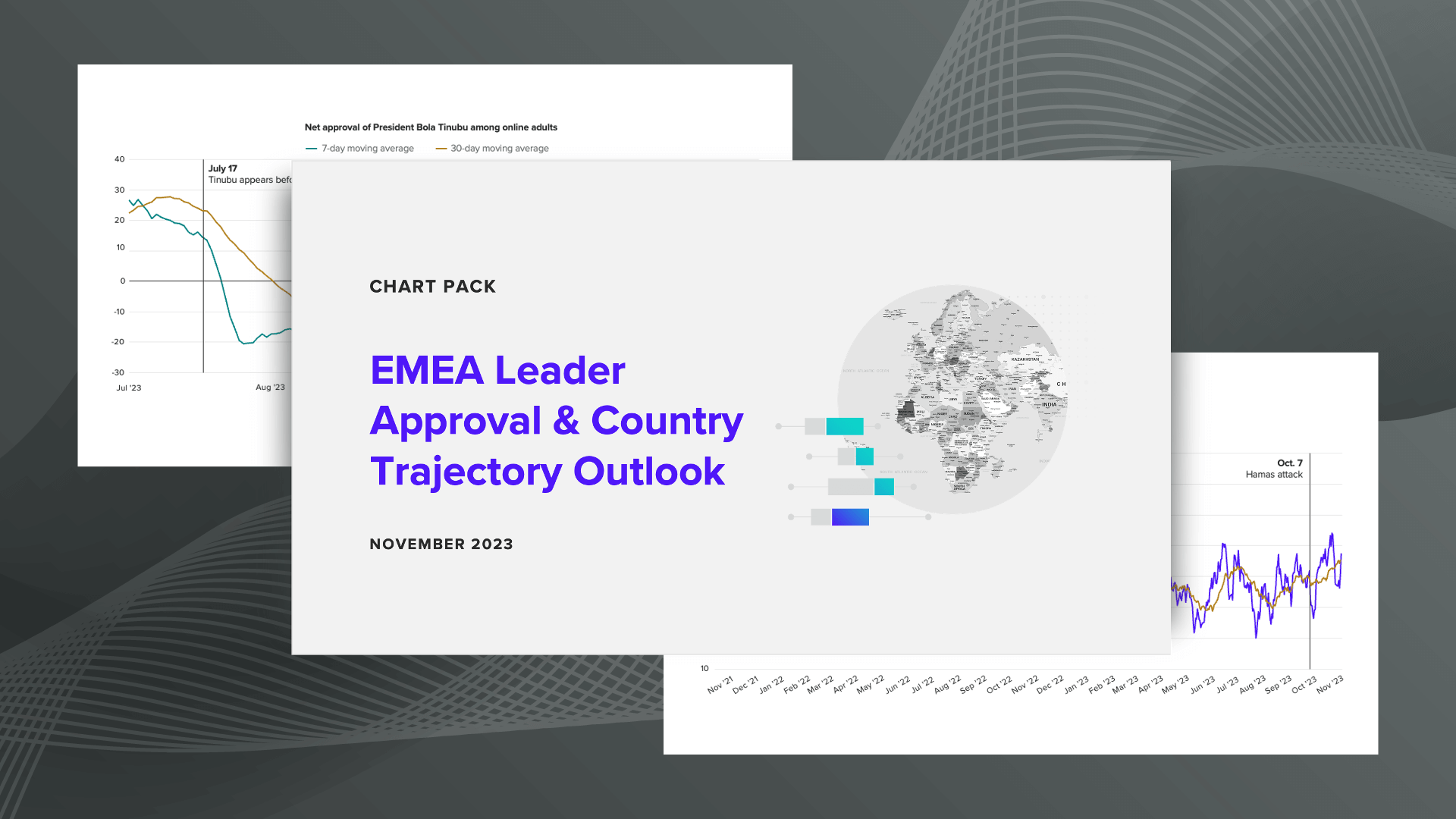Trans-Atlantic Ties Tracker
The trans-Atlantic economic relationship is the largest in the world in terms of transaction value, and among the most complex. Understanding this relationship is key to predicting the trajectory of trade and capital flows, regulation, technological cooperation, and economic statecraft.
The Trans-Atlantic Ties Tracker aims to help multinationals, financial services providers, policymakers and other interested parties better understand the trajectory of public opinion surrounding U.K.-U.S. and E.U.-U.S. relations. It also aids in assessing the implications for the trans-Atlantic economy, including through cross-border trade and capital flows, trans-Atlantic policy and regulatory coordination, and supply chains for consumer goods and critical tech.
Read the latest Trans-Atlantic Relations Report for further in-depth insights.
Key Takeaways
Western Europeans’ favorability of the United States remains lower than immediately before Russia’s invasion of Ukraine. European views of NATO have generally remained elevated above a pre-invasion baseline, but views of the United States have been trending down since mid-March and are now hovering where they were before Russia’s invasion. U.S. favorability toward both the European Union and NATO have also been declining in recent months and remain only slightly above pre-invasion levels.
U.S. adults’ support for energy sanctions on Russia has slightly rebounded, while German, French and Italian adults are seeing their lowest support in 2023. U.S. adults’ support for sanctioning Russian energy rebounded from a tracking low (33%) in September to 37%. Meanwhile, French (24%), Italian (20%) and German (32%) support for these sanctions are hovering near tracking lows in Q4 as natural gas prices rise amid wintertime supply concerns.
U.S. and E.U. adults increasingly say they want to prioritize cooperation on AI ethics as buzz over the dangers of AI remains at a fever pitch. U.S. adults are particularly likely to support bilateral cooperation with Europe to set AI rules of the road, putting it in third place in December, the highest level of prioritization thus far.
While the share of U.S. adults who said they would be willing to pay more for friend-shored goods remains fairly steady, the amount more they would be willing to pay has continued to trend slowly upward even as inflation has receded. 36% of those who would pay more said in December they would be willing to pay 6%-10% more and 18% said they would pay a sizeable 11%-15% more.
European Views of NATO and the United States
A Country-by-Country Comparison of European Favorability Toward the United States
U.S. and E.U. Priorities for Cooperation
U.S. Priorities for Cooperation With the European Union by Party Affiliation
Issue Spotlight: Sanctions, Trans-Atlantic Trade, Investment and Supply Chains
European Support for Energy Sanctions on Russia as of Q4 2023
U.S. Support for Inbound Investment Screening, Outbound Export and Investment Controls
Willingness to Pay More for Reshoring and Friend-Shoring
How Much More U.S. Adults Would Pay for Reshoring and Friend-Shoring
Source of This Data
Methodology
The Trans-Atlantic Ties Tracker relies on data collected through Morning Consult’s proprietary survey research capabilities. Interviews are conducted online.
All U.S. data aside from the country favorability series derives from monthly surveys conducted among representative samples of roughly 2,200 U.S. adults or 2,000 registered voters each, with unweighted margins of error of +/-2 percentage points. Data are weighted to approximate representative samples of U.S. voters or adults. U.S. country favorability data comes from Morning Consult Political Intelligence. Country favorability data is based on pooled five-day moving averages of U.S. adults and has an unweighted margin of error of +/-2 percentage points.
All European data aside from the country favorability series derives from surveys conducted among representative samples of roughly 1,000 adults per country, with unweighted margins of error of +/-3 percentage points each. Data are weighted to approximate representative samples of adults in each country. European country favorability data comes from Morning Consult Political Intelligence. Daily reports are based on pooled five-day moving averages of adults in France, Germany, Italy, Spain and the United Kingdom, each with an unweighted margin of error of less than +/-1 percentage point. The favorability map for Europe reports six-month aggregates with sample sizes ranging from roughly 7,800 to 63,000 adults per country, with unweighted margins of error of less than +/-1 percentage point each.
Morning Consult updated its weights for all countries featured in this tracker on Jan. 1, 2023. Dates indicated in all line charts correspond to the last day of survey fielding for each wave.
About Morning Consult
Morning Consult is a global decision intelligence company changing how modern leaders make smarter, faster, better decisions. The company pairs its proprietary high-frequency data with applied artificial intelligence to better inform decisions on what people think and how they will act. Learn more at morningconsult.com.
Email [email protected] to speak with a member of the Morning Consult team.
Sonnet Frisbie is the deputy head of political intelligence and leads Morning Consult’s geopolitical risk offering for Europe, the Middle East and Africa. Prior to joining Morning Consult, Sonnet spent over a decade at the U.S. State Department specializing in issues at the intersection of economics, commerce and political risk in Iraq, Central Europe and sub-Saharan Africa. She holds an MPP from the University of Chicago.
Follow her on Twitter @sonnetfrisbie. Interested in connecting with Sonnet to discuss her analysis or for a media engagement or speaking opportunity? Email [email protected].


